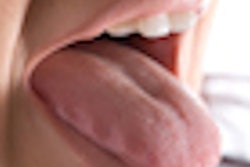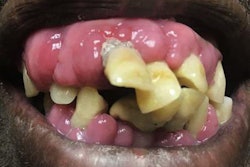
The risk of periodontitis may be significantly higher in individuals who have their tonsils removed, and that risk is magnified for those younger than 12, according to a study published on October 28 in the Journal of Periodontology.
Periodontitis occurs due to a complex relationship between periodontal pathogens and the immune system, which could be influenced by factors such as peritonsillar infection and sleep apnea. The authors believe the new study is the first to suggest long-term oral health side effects of tonsillectomy.
"Tonsillectomy performed in paediatric patients of less than 12 years old, increased the risk of developing periodontitis," wrote the group, led by Dr. Kevin Sheng-Kai Ma from the Center for Global Health at the University of Pennsylvania Perelman School of Medicine.
Both peritonsillar infection and sleep apnea are treated with tonsillectomy, which is one of the most common procedures performed on children in the U.S. Approximately 290,000 ambulatory tonsillectomies are performed annually in children younger than 15 in the U.S., according to a 2017 National Health Statistics Report.
The researchers surmised that even though tonsillar infections and sleep apnea may be alleviated in the short term by tonsillectomy, removing lymphoid organs changes the systemic and oral immune systems in the long term, which eventually leads to periodontitis.
To determine whether patients who had undergone tonsillectomy were at higher risk of postoperative periodontitis, the researchers conducted a population-based cohort study. Data from 1999-2013 were collected from the Taiwan Longitudinal Health Insurance Database.
The authors included cases of new-onset sleep apnea, periodontal disease, and chronic disease affecting the tonsils and adenoids. In total, 648 patients who underwent tonsillectomies and 648 who didn't undergo surgery were included in the analysis.
Of the 648 patients who underwent tonsillectomy, 230 cases were associated with postsurgical periodontitis. The incidence density of gum disease was also significantly higher in patients who had undergone tonsillectomy than in the general cohort (61 versus 49 per 1,000 person-years), the authors wrote.
Further analysis indicated the risk of periodontitis was especially high in tonsillectomy patients younger than 12 years. There were 73 cases of periodontitis among the 264 patients in the tonsillectomy group who were 12 or younger. The associations between gum disease and tonsillectomy in other age groups were not significant, the authors noted.
The study did have several limitations; for example, specific measures of periodontitis severity were not available. Additionally, prospective studies should be conducted to identify the need for regular dental follow-up of pediatric patients who had their tonsils removed or underwent other major surgeries that may affect long-term immune-related complications.
"These findings suggest long-term complications of tonsillectomy in the oral cavity," the group concluded.




















